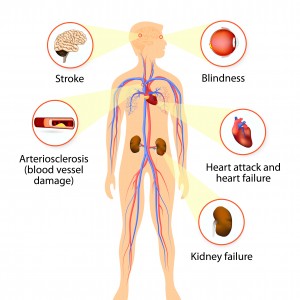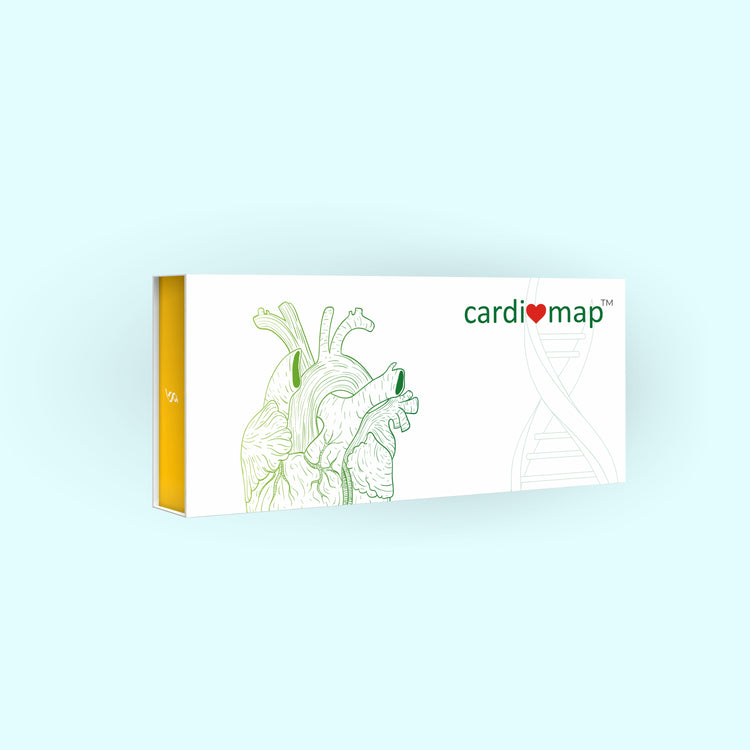Hypertension & Your Genes
May 25, 2015
7164 Views
 Key consequences of hypertension
Key consequences of hypertension
Key hypertension facts
[Gallieni 2014 and Farag 2014]
- Apart from known factors like high-salt diet and poor lifestyle, heritability (variation due to genetic factors) is significant for hypertension→ 30-50%.
- Hypertension is the major risk factor for cardiovascular disease, which is the biggest contributor to global mortality.
- Epidemiological data (WHO) for hypertension in Asian countries shows an alarming prevalence rate of ~40% (smaller studies in Indian subjects gave similar estimates – 39.4%, 43.5%). When pre-hypertensive subjects are included the total number spikes up to >40%!!
- A serious public health concern in India, stage 1 and stage 2 hypertension is on the rise in children and adults, urban and rural subjects alike. The age of onset has drastically lowered, too.

How does it work?
The genetic factor behind hypertension risk has been well understood by scientists and doctors alike. It is common knowledge that a positive family history of hypertension increases an individual’s risk (~4-fold). Risk-influencing polymorphisms in certain genes have been consistently identified in Asian and Caucasian populations and these serve as a useful tool to test for predisposition to hypertension, which is a complex (multigenic) physiological trait. An individual carrying such variations in his/her DNA is more likely to develop hypertension earlier in life.
Functionally important markers (polymorphisms within said genes) will help identify individuals at risk and facilitate early intervention. The efficiency of antihypertensive therapy (e.g., beta blockers like metaprolol response) also can be tested.
Since hypertension is a complex trait, investigation of the genes that contribute to susceptibility has been a major breakthrough in scientific research. Large studies have been performed in more than thousands of samples to identify small-to-moderate effects of single-letter variations in the DNA code. Inter-population differences in the impact of individual genes (genetic variation patterns) account for varied reports and findings from scientists, globally.
Genes implicated in the physiology of hypertension
[Natekar 2014, Padmanabhan 2012, Vatner 2005]
- Renin-Angiotensin (RAS) system – Angiotensin-converting enzyme (ACE) maintains the balance of salt and water molecules. This is an essential protein for regulating blood pressure. The mechanism is also known as RAAS (Renin-Angiotensin-Aldosterone system). Variants in the ACE gene have been studied for their link to hypertension risk in many studies.
- Fibroblast growth factor FGF5 – this is involved in cardiac cell (myocytes) growth and proliferation. This locus is involved in angiogenesis (production of new vessels) of the heart. One such variant in this region has been successfully replicated in South Asians too [Newton-Cheh 2009].
- AGT – produces Angiotensinogen-for the RAS pathway.
- CSK– cytoplasmic tyrosine kinase – this region has been found to be strongly linked with hypertension risk in large consortium-based studies. The gene product is expressed in vascular smooth muscle cells (present in the lining of the blood vessels) and is regulated by angiotensin II.
- Genes responsible for maintaining balance of electrolytes – (sodium (Na) and potassium (K) concentrations) – ion uptake, transport and reabsorption have been linked with essential hypertension, in multiple studies [Natekar 2014]. Examples are KCNJ1 and SCNN1A/1B.
Works cited
- Gallieni, Maurizio, et al. “The burden of hypertension and kidney disease in northeast India: the institute for indian mother and child noncommunicable diseases project.” The Scientific World Journal 2014 (2014).
- Farag, Youssef MK, et al. “Burden and predictors of hypertension in India: results of SEEK (Screening and Early Evaluation of Kidney Disease) study.”BMC nephrology 15.1 (2014): 42.
- Natekar, Aniket, et al. “Elevated blood pressure: Our family’s fault? The genetics of essential hypertension.” World journal of cardiology 6.5 (2014): 327.
- Padmanabhan, Sandosh, Christopher Newton-Cheh, and Anna F. Dominiczak. “Genetic basis of blood pressure and hypertension.” Trends in Genetics 28.8 (2012): 397-408.
- Newton-Cheh, Christopher, et al. “Eight blood pressure loci identified by genome-wide association study of 34,433 people of European ancestry.” Nature genetics 41.6 (2009): 666.
- Vatner, Stephen F. “FGF induces hypertrophy and angiogenesis in hibernating myocardium.” Circulation research 96.7 (2005): 705-707.
About the author
Rasika is the product specialist and scientific liaison for Mapmygenome’s personal genomics portfolio. With eight years of experience in sequencing, molecular biology, genetic data analysis and reporting, she currently works in the product team at Mapmygenome. Her key responsibilities include genomics product development, data curation, scientific content creation and management, data analysis and technical support for business development. Her key strength is a robust understanding of consumer genomics, including specialized areas such as pharmacogenomics, nutrigenomics and sports genomics. Rasika is also a certified group fitness trainer and Pilates (Balanced Body) Mat instructor.
Worried about hypertension?
Our expert genetic counsellors can help you understand patterns of hypertension in your family. Whether you want to prevent hypertension, manage it better, or avoid related complications, we can help you.
Visit mapmygenome.in or write to info@mapmygenome.in or call 1800-102-4595. Today!
